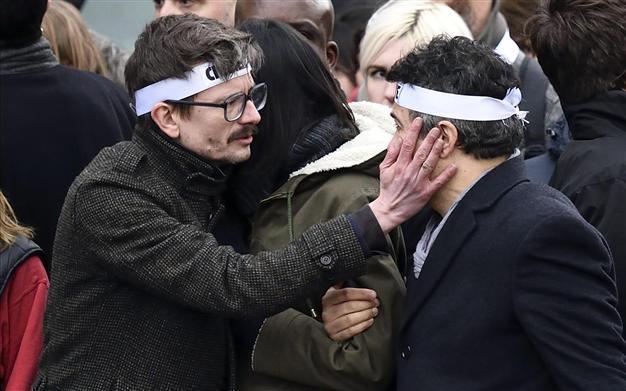Charlie Hebdo issue coming out in English, Arabic, Turkish
PARIS - Agence France-Presse

Cartoonist Luz (L) touches the face of Dr Patrick Pelloux as they and members of the Charlie Hebdo satirical magazine team take part in a Unity rally 'Marche Republicaine' on Jan 11, 2015 in Paris in tribute to the 17 victims of the three-day killing spree. AFP Photo
This week's post-attack edition of the French satirical magazine Charlie Hebdo will be made available in six languages including English, Arabic and Turkish, the chief editor said Jan. 13.Only the French, Italian and Turkish versions will be printed, however, while the other three -- English, Spanish and Arabic -- will be offered in electronic form, editor-in-chief Gerard Biard told a Paris news conference. A Charlie Hebdo columnist, Patrick Pelloux, had previously said the edition would be available in 16 languages.
The cover of Charlie Hebdo since its staff were murderously attacked by Islamist gunmen last week shows a cartoon of the Prophet Muhammad crying and holding up a "Je suis Charlie" sign under the words: "All is forgiven."
The front page was released to media ahead of the magazine's publication on Jan. 13. Three million copies of the special "survivors' edition" are being printed and will be made available in 25 countries, translated into 16 languages because of international demand.
Worldwide sympathy and "Je Suis Charlie" solidarity rose up around Charlie Hebdo in the wake of the attack against it last Jan. 7, in which 12 people were killed including five of its top cartoonists.
But the magazine's fresh caricature of Muhammad could renew fury by some extremely devout Muslims who believe it is forbidden to depict their prophet in any way.
The two gunmen who attacked Charlie Hebdo's offices in Paris last Jan. 7 said as they left the scene that they had "avenged the Prophet Muhammad."
The staff first started receiving death threats in 2006 when they republished cartoons by a Danish newspaper, Jyllands-Posten, that had triggered violent riots in some Muslim countries.
The offices of the weekly were firebombed by suspected Islamists in 2011 when it published other cartoons making fun of Mohammad, causing no injuries.
The surviving employees of Charlie Hebdo have sworn to uphold its tradition of lampooning all religions, politicians, celebrities and news events. Islamic extremists have often been ridiculed in its pages through provocative and irreverent cartoons.
We will "cede nothing" to extremists seeking to silence them, the publication's lawyer, Richard Malka, told French radio on Jan. 12.
"In each edition for the past 22 years there has not been one where there have not been caricatures of the pope, Jesus, priests, rabbis, imams ou Muhammed," he said.
It would have been "surprising" if a Muhammed cartoon did not feature in the new issue, he said.
He stressed that Charlie Hebdo saw itself as "not a violent newspaper but an irreverent one."
The surviving Charlie Hebdo staff have since Friday been working out of the offices of another French newspaper, Liberation, with equipment loaned by other media organizations.
Their own blood-soaked offices remain sealed by police, with the entrance covered with flowers, pencils and candles in tribute to the dead.
The gunmen who had attacked Charlie Hebdo, brothers Cherif and Said Kouachi, claimed to belong to the jihadist group Al-Qaeda in Yemen.
They were killed on Jan. 9, as was an accomplice claiming affiliation to the rival Islamic State in Iraq and the Levant (ISIL), Amedy Coulibaly, in separate but coordinated French commando raids on sites in and near Paris where they had taken hostages.
In all 17 people and the three Islamist attackers were killed in three days of violence.
The 44-year-old Charlie Hebdo newspaper had been sliding towards bankruptcy before the attack against it. It used to typically sell only half of the 60,000 copies it printed weekly.
But since gaining worldwide notoriety, it has earned pledges of support from the French government and media groups.
With the attacks, the magazine has become a national symbol of free speech. Huge crowds, including 1.5 million in Paris in the biggest rally in French history, took to the streets Jan. 10, many carrying signs saying: "Je suis Charlie."
















